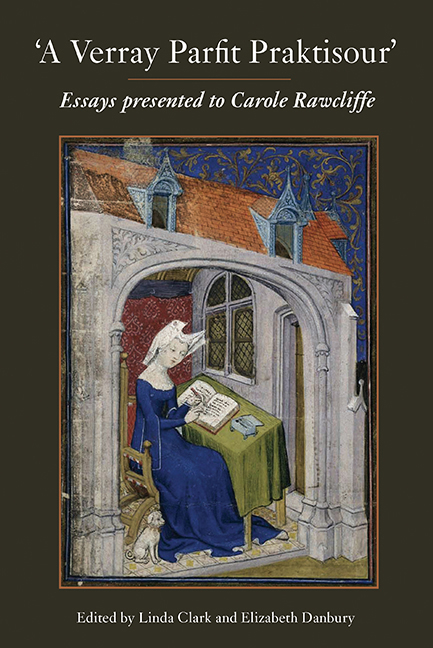Book contents
- Frontmatter
- Contents
- List of Illustrations
- List of Contributors
- Acknowledgements
- Abbreviations
- Tributes
- 1 Coslania, Norwich: an Archaeological Contribution to Early Medieval Urban History
- 2 A Queen in Rebel London, 1215–17
- 3 Defensive Officials and Defensive Levies in Fourteenth-Century Muster Rolls: an East Anglian Perspective
- 4 Lettice Oo? Queen Isabella's Accidental Apothecary
- 5 The First Instrument of Medicine: Diet and Regimens of Health in Late Medieval England
- 6 Politics and Piety: Norwich City Churches, Commemoration and Networking for the Afterlife
- 7 Telling the Time in Chaucer's London
- 8 The Bankrupt Bibliophile, William Paston, 2nd Earl of Yarmouth (1654–1732)
- 9 Ottomans, Neo-Ottomans and Invented Tradition in Hospital Music Therapy
- The Published Works of Carole Rawcliffe, 1976–2016
- Index
- Tabula Gratulatoria
9 - Ottomans, Neo-Ottomans and Invented Tradition in Hospital Music Therapy
Published online by Cambridge University Press: 09 May 2017
- Frontmatter
- Contents
- List of Illustrations
- List of Contributors
- Acknowledgements
- Abbreviations
- Tributes
- 1 Coslania, Norwich: an Archaeological Contribution to Early Medieval Urban History
- 2 A Queen in Rebel London, 1215–17
- 3 Defensive Officials and Defensive Levies in Fourteenth-Century Muster Rolls: an East Anglian Perspective
- 4 Lettice Oo? Queen Isabella's Accidental Apothecary
- 5 The First Instrument of Medicine: Diet and Regimens of Health in Late Medieval England
- 6 Politics and Piety: Norwich City Churches, Commemoration and Networking for the Afterlife
- 7 Telling the Time in Chaucer's London
- 8 The Bankrupt Bibliophile, William Paston, 2nd Earl of Yarmouth (1654–1732)
- 9 Ottomans, Neo-Ottomans and Invented Tradition in Hospital Music Therapy
- The Published Works of Carole Rawcliffe, 1976–2016
- Index
- Tabula Gratulatoria
Summary
This patient is not etherised upon a table. She is sitting upright in a high-backed hospital chair, but she does have an oxygen mask on and an elasticated hospital hat. Behind her stands a drip and a bank of screens displaying vital signs. That is not surprising, for she has just undergone cardio-vascular surgery in Istanbul's Memorial Hospital. She is being visited by her surgeon Professor Bingür Sönmez and the anaesthetist Dr Erol Can. After checking the screens for the patient's pulse and blood pressure, the professor pulls out a ‘traditional’ flute and starts playing a popular Turkish tune. The anaesthetist joins in on the yayli tanbur, a large Ottoman-era stringed instrument resembling a giant banjo but played with a bow. According to the report published in The Guardian on 28 August 2011, this ‘unusual approach to modern medicine’ is ‘producing results’. Sonmez and Can are ‘reviving traditional music therapy, a form of medical treatment that is almost 1,000 years old’. Used as a complementary therapy, ancient musical modes can produce ‘significant psychological and physiological outcomes’.
The protagonist, as reported, was Dr Can. He discovered music therapy working in a hospital in Sofia, in his native Bulgaria. After emigrating to Turkey in the 1960s he learned the ney flute ‘used in traditional music therapy hundreds of years ago, making use of the psychological and physiological effects of the makam’ – that is, in classical Arabic and Turkish music, the mode. There is supposedly a different makam for every condition. Can says:
the so-called rast makami has a positive effect if a patient suffers from anorexia, whereas the hicaz makami should be played if a patient needs to be kept on a diet. A restaurant that plays music in the hicaz mode would probably go out of business after a while, because it keeps customers from eating!
Sönmez subtly modifies these claims to clear and specific, even counter-productive, results, which are common among ancient musical cultures from Greece to India. Music, he says, can only be complementary to biomedicine. It may lower the heart and blood pressure and thus reduce the need to prescribe some drugs, but it does not do more.
- Type
- Chapter
- Information
- A Verray Parfit PraktisourEssays presented to Carole Rawcliffe, pp. 175 - 184Publisher: Boydell & BrewerPrint publication year: 2017



